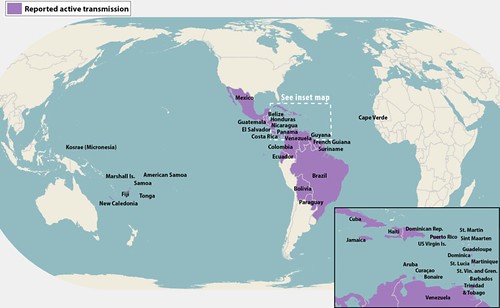Traveling through foreign lands where infectious outbreaks are present is dangerous. Knowledge of these outbreaks is the best way to avoid such an infection. In recent years, the Zika virus has been spreading throughout numerous countries in South America, and now there are a number of cases on the United States mainland in the Miami area. Here’s what you need to know about the Zika virus to avoid any possible infection or disruption to your next vacation.
What is Zika?
The Zika virus was first discovered in 1947 in Uganda, though the first human cases were found in 1952. While Zika has caused infections across Central Africa and Southeast Asia in the past, the current outbreak of the virus is centered in South and Central America. The virus is commonly spread through bites from the Aedes species of mosquito. Once an individual is infected, the virus can be contracted and spread further by other mosquitoes that bite infected individuals.
Where is it found?
The counts of confirmed Zika cases are low because, due to the mildness of the disease, it often goes unreported. In May of 2015, an outbreak was reported in Brazil, but it has been estimated that Zika was circulating for up to two years before the outbreak was identified. Since then, many countries in South and Central America have identified outbreaks of the virus consistent with the range of the Aedes genus of mosquito.
(map via CDC)
What are the symptoms?
Only about 1 in 5 infected people will become ill. Zika has mild symptoms overall which usually do not require hospital visits. These symptoms commonly include fever, joint pain, rash, conjunctivitis, muscle pain, and headache. These symptoms can last anywhere from a few days to a week after being bitten, though the virus itself remains in the blood for slightly longer. Once infected, it is likely that an individual is protected from future infection. The CDC recommends taking medicine like ibuprofen to help manage symptoms, as well as avoiding contact with mosquitoes in order to prevent further spreading of the virus.
There are more serious concerns, however, specifically for women who are pregnant. Following many studies performed in 2016, strong links between Zika virus and microcephaly (a syndrome characterized by a shrunken head and abnormal brain development in infants) has been confirmed. Besides microcephaly, Zika is also linked to other developmental brain disorders and neurological complications. Even women who are not pregnant, but who are considering pregnancy in the near future, should carefully weigh their options before and take preventative measures when traveling in Zika-infected areas.
How does this affect my trip?
Zika isn't, necessarily, a huge worry when traveling. By observing strict adherence to mosquito protection (using insect repellant containing DEET and covering extremities with clothing), Zika should not prove to be a problem during your trip. However, women who are pregnant or planning to become pregnant should avoid traveling to Zika-infected areas if possible. For those that do travel to these areas, be especially vigilant about protecting yourself from mosquitoes.




